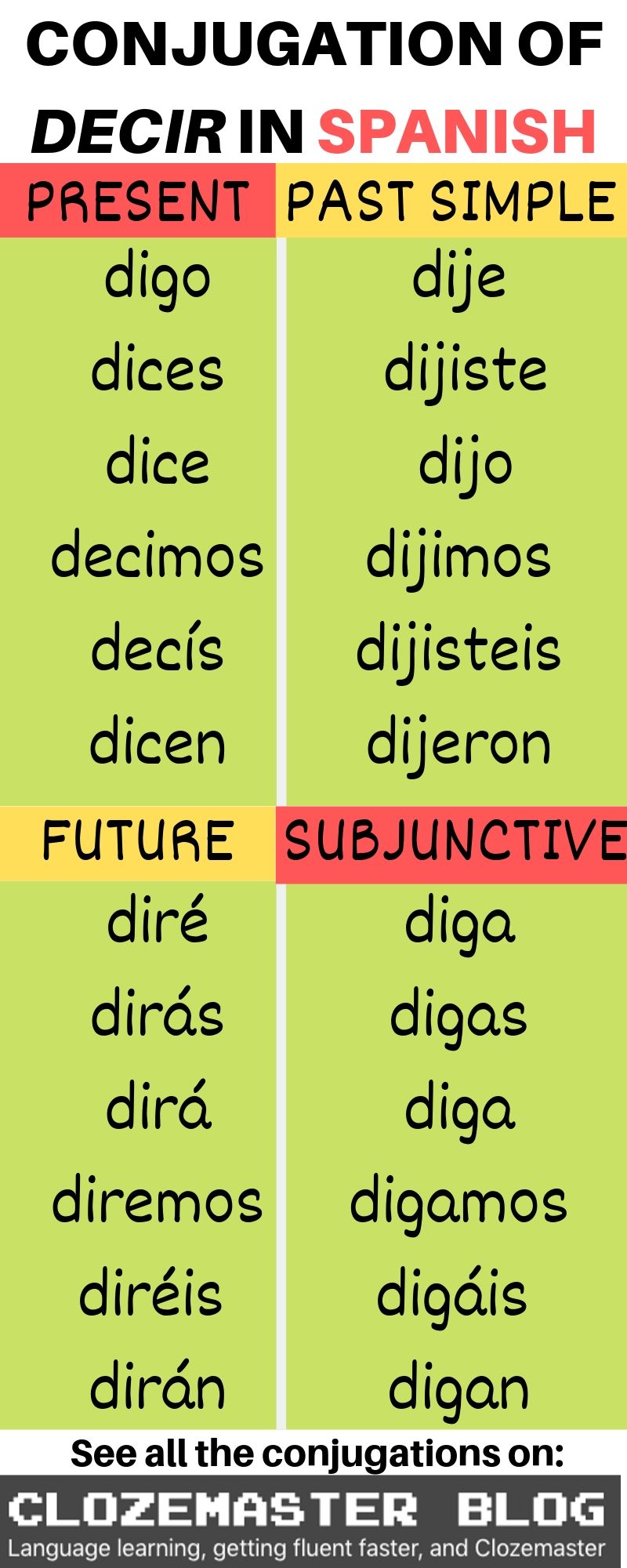
“Decir”, meaning to tell or to say, is a pretty important word in Spanish, because, well, how can you communicate without knowing how to say? Unfortunately, though, the “decir” conjugation is one of the most complicated of the Spanish language, with almost every tense having different irregular forms. Luckily for you, you have this article, which will guide you through how to use and remember each and every one, with examples!

Verbals of decir
To use decir in a sentence, you will either conjugate it, or use a verbal. Let’s start by seeing how the three verbals work with this verb.
Infinitive: decir (to say)
Example: ¿Me vas a decir si te gustó o no? | Are you going to say if you liked it or not?
Gerund: diciendo (saying)
Example: El muchacho está diciendo que Miguel salió. | The guy is saying that Miguel went out.
See more on how to use the gerund in our estar conjugation guide.
Participle: dicho (said)
Example: Toni nunca habría dicho eso si hubiera sabido la verdad. | Tony would never have said that if he had known the truth.
For an explanation on this structure, see our article on how to use haber.
Note: dicho is also a noun meaning “saying”.
Decir conjugation: basic forms
The most common decir conjugation forms are as follows:
| Subject | Present | Preterite | Future | Imperfect |
| yo | digo | dije | diré | decía |
| tú | dices | dijiste | dirás | decías |
| él, ella, Usted | dice | dijo | dirá | decía |
| nosotros | decimos | dijimos | diremos | decíamos |
| vosotros | decís | dijisteis | diréis | decíais |
| ellos, ellas, ustedes | dicen | dijeron | dirán | decían |
Examples of decir conjugation in present tense
- Sólamente digo que no hay nada interesante en ese barrio. | I’m just saying there’s nothing interesting in that neighbourhood.
- Jorge siempre dice que no comamos carne. | Jorge always tells us not to eat meat.
- ¿Dicen que estamos destruyendo este planeta. | They say that we are destroying this planet.
The thing to note here is that, in the conjugated forms, the ‘i’ moves into the first syllable of the word, and then, other than the first person irregular conjugation, the verb conjugates as a normal ‘ir’ verb.
Examples of decir conjugation in past preterite tense
- Dije que él estaba loco y tenía razón. | I said that he was crazy, and I was right.
- Dijiste que tú me ibas a cuidar pero mentiste. | You said you were going to take care of me but you lied.
- Dijisteis que iban a estar en el restaurante para celebrar conmigo. | You said that you were going to be in the restaurant to celebrate with me.
As you can see, the past preterite conjugation of “decir” is very irregular in Spanish. However, as is usually the case with Spanish, it is just a matter of remembering the first part of the word (the stem), and then you will find that all the forms follow the same pattern.
Examples of decir conjugation in future tense
- Hoy le diré que no lo quiero ver más. | Today I’ll tell him that I don’t want to see him anymore.
- Cuando Marco vea todo lo que yo he hecho por él, me dirá que gracias. | When Marco sees everything I’ve done for him, he will say thank you to me.
- En 10 años diremos que llegamos hasta done estamos por que trabajamos duro. | In 10 years, we’ll say that we got to where we are because we worked hard.
For the future tense, the stem is shortened to only consist of “dir”. From there, the future is conjugated as normal.
Examples of decir conjugation in past imperfect tense
- Cuando yo trabajaba en servicios, siempre decía que el cliente era lo más importante. | When I worked in services, I always said that the client was the most important.
- Daría decía toda la noche que se quería ir. | Daria said all night that she wanted to go.
- Antes de fallecer, mi abuela siempre decía que lo que más vale es como tratamos a los demás. | Before she died, my grandmother always used to say that what matters the most is how we treat others.
Decir conjugation: Advanced forms
The more advanced decir conjugation forms are as follows:
| Subject | Present Subjunctive (that you) say | Imperfect Subjunctive (if I) say… |
Conditional (I) would say |
| yo | diga | dijera | diría |
| tú | digas | dijeras | dirías |
| él, ella, Usted | diga | dijera | diría |
| nosotros | digamos | dijeramos | diríamos |
| vosotros | digáis | dijerais | diríáis |
| ellos, ellas, ustedes | digan | dijeran | dirían |
Examples of decir conjugation in present subjunctive
- Norma no deja que yo diga nada. | Norma doesn’t let me say anything.
- No me digas que no quieres salir con ella. | Don’t tell me that you don’t want to go out with her.
- Cuando mis amigos digan que pare, pararé. | When my friends tell me to stop, I will stop.
Examples of decir conjugation in imperfect subjunctive
- Si tú dijeras la verdad, nada de esto estaría pasando. | If you told the truth, none of this would be happening.
- La situación hizo que Jaime dijera algo bueno por una vez. | The situation made Jaime say something good for once.
- Me pareció que ustedes dijeran que les gustó el obra. | It seems to me that you guys said you liked the artwork.
Examples of decir conjugation in conditional mood
- Si yo quisiera estar con Fernando, lo diría. | If I wanted to be with Fernando, I would say so.
- Si Amelia hiciera algo bueno, tú dirías que era por que ella está obligada. | If Amelia did something good, you would say that it was because she was forced to.
- Aunque nada mejorara, vosotros todavía diríais que todo va bien. | Even if nothing improved, you would still say that everything is going well.
Final words: decir conjugation in imperative
You might’ve heard songs saying things like “dime, dile, dilo…”. Beleive it or not, this is yet another form of the verb “decir”! The singular command form of the verb “decir” is simply di. So if you want to tell someone to say something in Spanish, you can simply say “di” + what you want them to say. The reason it might seem like there are so many forms, though, is because “di” combines with pronouns and attaches them onto the word itself.
Di can combine with:
- me: dime (tell me)
- le: dile (tell him/her)
- les: diles (tell them)
- lo: dilo (say it)
You can also combine the direct object pronoun “lo” with the other three to make a longer word, so you have:
- me + lo: dímelo (say it to met)
- le/les + lo: díselo (say it to him/her/them)
In Spain, the plural command form for “decir” is “decid”. In other Spanish-speaking countries, they use “digan” to make a command to more than one person. In either case, they can be combined with the pronouns to make longer words in much the same way that “di” can.
Examples of decir conjugation in imperative:
- Dime que me amas. | Tell me you love me.
- Di que no has bebido hoy. | Say you haven’t drunk today.
- Dile tú que no quieres escuchar más de él. | Tell him yourself that you don’t want to hear from him anymore.
- Decid la verdad ahora o os voy a castigar. | Tell the truth now or you will be punished.
- Tienes algo que decirme? Dímelo. | Do you have something to say to me? Say it to me.
Hopefully this article has cleared up some of your confusion around the decir conjugation in Spanish. Remember, decir is irregular so what is true for this verb is not necessarily true for other verbs.
If you want to see how regular verbs are conjugated, or just want to brush up on your knowledge of the different tenses, make sure you check out our overview of tenses in Spanish, which has all the info you need.
Don’t forget to use Clozemaster to practise your Spanish sentences and test your knowledge of Spanish grammar!
Challenge yourself with Clozemaster
Test your skills and see what you’ve learned from this article by playing a selection of sentences with conjugated forms of the Spanish verb decir:
Sign up here to save your progress and start getting fluent with thousands of Spanish sentences at Clozemaster.
Clozemaster has been designed to help you learn the language in context by filling in the gaps in authentic sentences. With features such as Grammar Challenges, Cloze-Listening, and Cloze-Reading, the app will let you emphasize all the competencies necessary to become fluent in Spanish.
Take your Spanish to the next level. Click here to start practicing with real Spanish sentences!



3 thumbs up for clozemaster doing such an exellent job at teaching spanish…good explanations and examples…I´ll be back!
Correct me if I’m mistaken, but in your “verbals” section, the participle is visto (seen). Should that be dicho (said)?
Thank you for bringing this to our attention! Should be fixed now.